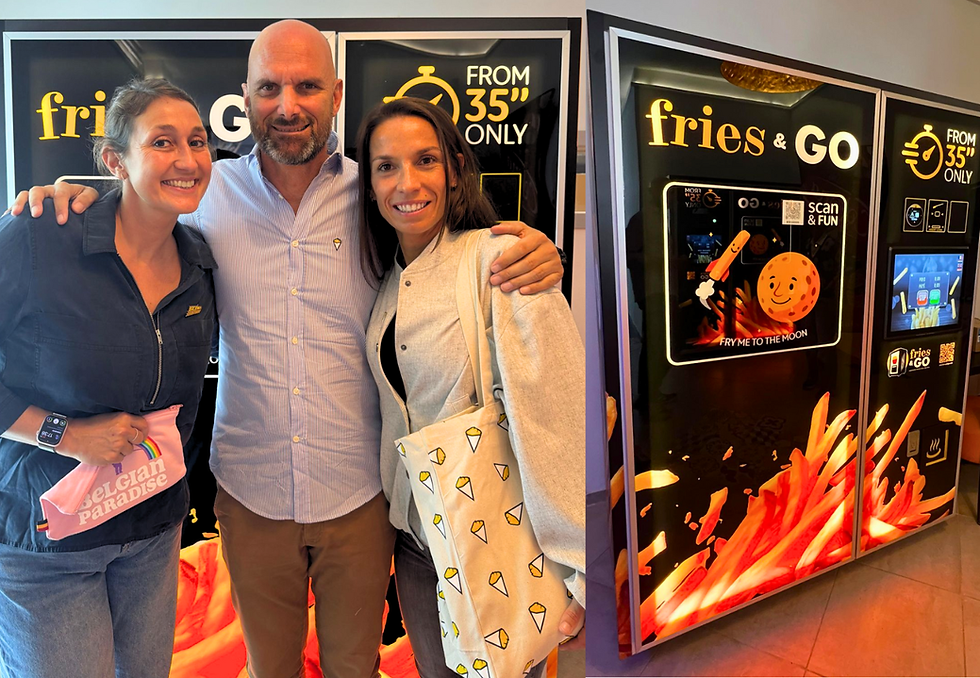Fries & Go: The Belgian Fries Vending Machine That Serves a Packet in 35 Seconds
- François Remy

- Oct 28, 2025
- 3 min read
Fries & Go aims to combine the quality of authentic Belgian fries with the speed of an automated machine. This concept by two entrepreneurs from Liège is designed for high-traffic locations but also for event catering . It promises to set a new standard in the world of self-service, ready-to-eat products.

A combination of technology, functionality, and culinary tradition. With their brand Fries & Go, Arianne Polis and Yoko Uhoda have launched the very first fries vending machine in the Benelux (because yes, there was already a 'French Fries' version). The first machine was installed at the entrance of a Carrefour Market in Liège. It will soon be expanded nationwide through partnerships.
"We are proud to support this innovative Belgian start-up, which is revolutionizing a pillar of our culture," says Arnaud Lesne, Director of Innovation & Partnerships at Carrefour Belgium.
The self-service machine eatures a freezer capable of holding up to 20kg of fries and two fryers for a double-fry process in vegetable oil. The machine produces a serving in record time, with or without ketchup (currently the only available sauce, to avoid allergy issues). The process is fast but aims to reproduce the look and feel of traditional chip shops.
A Delicacy in a Smart Serving
"As a child, fries were an integral part of our family traditions. We ate them at least once a week at my grandparents'. They embody both a culture and the art of togetherness," explained Arianne Polis, who also recalls the essential place sport has always occupied in the life of this former junior member of the national triathlon team. "It taught me one essential thing: balance. That's why quality always comes first at Fries & Go. Because enjoying a tradition should be a pleasure, not an excess."
After ten years working as a European procurement manager (FMCG - Food) at Mercadona, Spain's largest retail group, Arianne and her partner Yoko had an innovative idea. At the end of a cultural outing in Liège, they noticed that the local pizza machine was the only way to grab something quick to eat. But why not fries? And thus, the Fries & Go cone, serving 110g of fries for €3.50, was born.
Many come up with good ideas, but the challenge is to bring them to life and market them. To achieve this, the co-founders of Fries & Go have negotiated regional exclusivity in the Netherlands, Luxembourg, and the Iberian Peninsula with the Croatian manufacturer of their fries vending machine.
Belgium as the Standard of Quality
To make their European ambitions happen, Arianne and Yoko are targeting high-traffic areas (supermarkets, train stations, cinemas, etc.) that require a 24/7 service. From the start, they focus on the specific quality of the product, using 100% Belgian ingredients. The oil, potatoes, and sauce are all locally sourced.
The young fries company has also signed an agreement with Maison Despriet, a Cash & Carry specialist in food products since 1965, which has become the first official distributor for the occasion. This partnership streamlines logistics for future franchisees by supplying nearly all the resources required for the machines.
In addition, Fries & Go prioritizes on crispy and warm fries to appeal a busy but demanding clientele. Early feedback consistently mentions the unexpected quality of the fries. The immediate challenge is to convince the public that a packet of fries worthy of the name is now within reach.
Gold bars?
Generally, a vending machine business model is a low-risk option for entrepreneurs. These machines differ from traditional stores in that they require low initial investment and minimal operating costs (no wage costs or unaffordable commercial leases).
They operate continuously and generate passive, scalable income that responds to the constant demand for fast, accessible products that can be easily managed remotely.The rise of Fries & Go illustrates the need, in the on-the-go catering segment, to integrate automation to meet the demand for a quick bite that is available 24/7, without compromising the quality of the hot product.
This appears to indicate that the industry is shifting towards ultra-optimized models (low operating costs, minimal human intervention) to maximize profitability in strategic areas. For consumers, this confirms a strong trend toward extreme convenience, accepting that even traditionally prepared food can now be eaten almost instantly.





